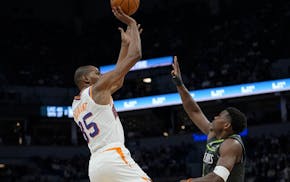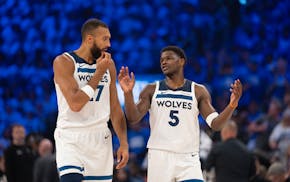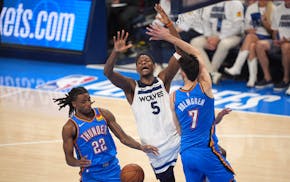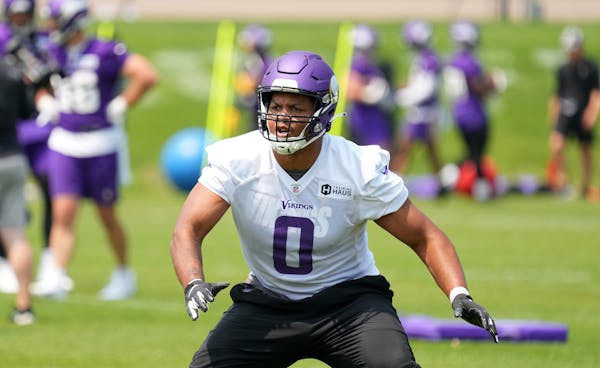Brad Childress coined the "Kick-(Rear) Offense.'' In the near future, the Vikings will be completing their transformation to the K.O. Offense.
Kevin O'Connell is expected to discard star running back Dalvin Cook, moving the Vikings closer to the blueprint of O'Connell's previous employer, Sean McVay and the Los Angeles Rams.
McVay became a young head coach in 2017. Like O'Connell with the Vikings, McVay had immediate regular-season success, debuting with an 11-5 record. Like O'Connell, McVay's first team lost to an unimpressive playoff opponent, Atlanta.
In McVay's second season, he built his offense around star running back Todd Gurley. The Rams went 13-3 and made it to the Super Bowl, where Gurley's injuries limited their offense and led to a 13-3 loss to Bill Belichick and the Patriots.
Gurley would play for the Rams just one more season, as injuries robbed him of the explosiveness that made him special. Wary of relying on a running back or a running game, McVay began building the passing offense that would produce a Super Bowl title after the 2021 season.
(McVay also hired a coordinator from the Phillips family. Wade was his defensive coordinator for his first Super Bowl appearance; O'Connell hired Wes Phillips, Wade's son, as his offensive coordinator.)
McVay drafted running back Cam Akers in the second round in 2020. He won the Super Bowl, though, with an inexpensive running back rotation, and a three-receiver set that highlighted a superstar, Cooper Kupp.
The Vikings have their star receiver in Justin Jefferson. Despite having one of the worst defenses in the league, O'Connell pushed for the Vikings to select a receiver in the first round in this April's draft. Jordan Addison, K.J. Osborn and tight end T.J. Hockenson will punish those who overplay Jefferson.
The Vikings are about to adopt an inexpensive running back rotation. Alexander Mattison will be the lead back, with Kene Nwangwu, Ty Chandler and seventh-round draft pick DeWayne McBride competing for snaps.
Limiting investments at the running back position in a salary-cap league allows more to be spent at other positions, and most other positions are more important than running back.
Mattison is a better pass blocker than Cook, and if O'Connell's goal is to run the best possible passing offense while getting enough rushing yards to keep defenses honest, pass-blocking skills will be vital.
Cook has begun to show signs of wear. He rushed for 111.2 yards per game in 2020, then 89.2 in 2021 and just 69.0 last year. To his credit, he played in all 18 games, and he made game-changing plays against Washington, Miami, Buffalo and Indianapolis, but a speed back can't afford to lose a step.
Jefferson's brilliance and the Vikings' ability to win close games in 2022 obscured the fact that Cook and veteran receiver Adam Thielen were not as productive as they should have been.
NFL teams have discovered that they can win without a star running back. The only championship-caliber team that is heavily invested in its top running back is San Francisco, which traded for Christian McCaffrey last year. The 49ers could afford to do so because they aren't spending much at quarterback and might have the best overall roster in the NFL.
The Chiefs spent a first-round draft pick on Clyde Edwards-Helaire in 2020. They shouldn't have. They won a Super Bowl the year before they drafted him. They won the Super Bowl last year with him not playing in the postseason. He has rushed for 49.2 yards per regular-season game during his career, a total many teams reach by handing the ball to a low-round draft pick or undrafted free agent.
The leading rusher in the Super Bowl for the past four champions: seventh-round pick Isiah Pacheco (Chiefs); second-round pick Akers (Rams), who rushed 13 times for 21 yards; Leonard Fournette, signed by the Buccaneers after the Jaguars released him; Damien Williams (Chiefs), an undrafted free agent.
The Vikings are moving in the right direction by discarding Cook, and that path was charted by O'Connell's old boss.

Souhan: Anxiety and depression in the NFL helped inspire Lindsey Young's children's book
Souhan: For Lynx star Napheesa Collier, 'Phee' is just fine

Souhan: Will the Wolves trade for Kevin Durant? Should they?

Souhan: If Edwards is a franchise player, he needs to act and play like it


